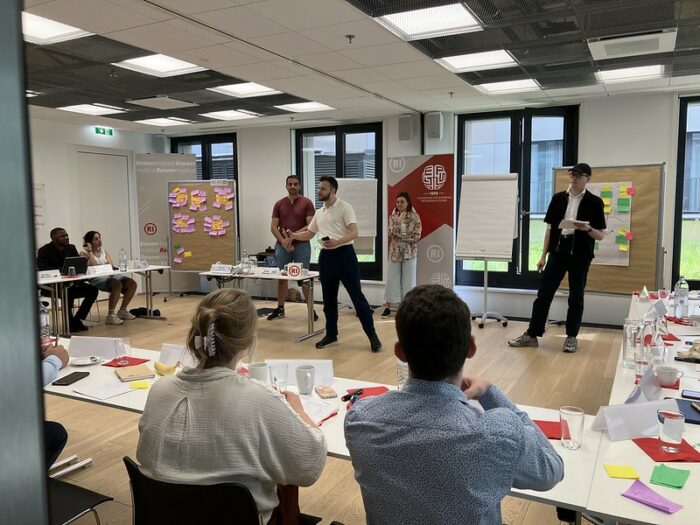The Progressive Post
Towards normality!
All responsible political formations, which plan their actions in both the short- and long-term perspectives, encapsulate their strategies in certain time brackets which are marked by subsequent elections. Such momentum is also approaching in Poland, where in autumn 2023 there will be parliamentary elections. Lewica (the Left) aspires to play a key role.
The compass to walk the electoral campaign trail will certainly be the programme, to be adopted at the party congress. However, one must admit that the developments of the last months will have an impact as well. The pandemic, the war in Ukraine, the energy crisis, and the sky-rocketing inflation are examples of the themes which may not end up dominating the campaign but will certainly be important showstoppers.
All these aspects touch upon the question of the needs and the worries of individuals. The sequence of the mentioned developments has undermined the previous perception of security. If the Left wants to regain votes, it needs to present proposals aiming at restoring security. Therefore, the spotlight will focus on: individuals, families, security.
The ultra-conservative Law and Justice Party (PiS), which has been governing for seven years, is using the term ‘family’ as a hashtag. For the right-wing, the concepts of ‘individual’ and ‘family’ are part of their ideology, and, consequently, are instrumentalised for their political fight in a way to enhance the language of hatred and exclusion. For the Left, families are shaped by the way people get together. There is no hierarchy between better and worse types of families. For us, families are young married couples, but also seniors, children, and inhabitants of large towns and small agglomerations. These are the people the Left wants to address with its pledges about a decent life and decent incomes. Today, PiS has turned its back on hard-working families, while the Left instead is determined to take care of them.
Security has only grown in relevance since Russia’s unprecedented attack on Ukraine and is a natural need of individuals, who expect to live in security. In this context, much attention will necessarily be devoted to defence policies. However, it is equally important to continue fighting for safe jobs, safe education, and a safe home for everyone. Poland should continue supporting Ukraine, in its fight for victory, and help the Ukrainians, who fled abroad. At the same time, however, one cannot forget the needs of the Polish middle- and low-income classes, who are most affected by the consequences of the war.
The crisis has emphasised many problems that had been swept under the carpet for many years. Poland is a country where 14 million people have no access to public transport, half of the children have no access to kindergartens, and a woman who lives, for example, in the Podkarpacie region, must travel over 100 kilometres to reach a gynaecologist. The Left understands these issues, knows how to deal with them and has to stand tall for high-quality and accessible public services. This will be a fundamental part of the electoral programme, which is also related to how we see the place of Poland in a united social Europe.
The partnership with Brussels needs to serve both partners and needs to contribute to building a strong Union. The Left has never doubted the need to invest in the Union’s development and will always be active in trying to convince Polish women and men to adhere to this idea. We will heavily emphasise the necessity to enhance solidarity between member states of the Union, which is key to, for example, ensuring energy security. Unlike PiS, we see the EU as a partner, and not as a cash machine. We want to see the funds from the Recovery and Resilience Facility transferred to Poland, which is why we are so strongly demanding the restoration of the rule of law. In that sense, we also want that every crime committed by the people connected with PiS against the state is prosecuted and tried.
The resources coming from the EU must serve to ensure greater social justice. This is why we want to invest them in the construction and renovation of the hospitals, as also in new appartements; and in the refurbishment of train and bus stations, and to make sure that public transport reaches many places that today are not connected to it. We will be investing in green energy, which is a modernising agenda, especially in Poland, where the only policy towards climate change has been a lack of any agenda for so many years. The Left has the Green New Deal in its DNA, and this is also why we propose to create a Center for Energy Transformation, an agency specialised in advising local and regional governments on energy policy.
Furthermore, we will propose a just and progressive tax system. People, who belong to the middle- and low-income classes have to pay fewer taxes, while the richest should pay the most. We believe, however, that a just fiscal and public finance system should not be a burden for entrepreneurs, especially of SMEs. We want to increase taxes for international corporations and digital giants. People need to be convinced that the state is equally just for all.
To reinforce the public services system, we propose a 20 per cent increase in salaries for those who deliver them: nurses, teachers, and public servants, thanks to whom the state, and the society, can function. The deficits in funding have become particularly clear during the Covid-19 pandemic and it is our joint responsibility to take care of them.
In times of crisis, one cannot disregard seniors, whose pensions often do not allow them to make ends meet. From the perspective of security for all within a family, the elderly are those who are most vulnerable, and this motivates the Left to propose a package of shielding policies. The indexation that matches the level of inflation, the possibility to purchase prescribed medications for a symbolic 5 złoty (1€) and the so-called ‘widow(er) pension’ (the right to transfer the higher pension to the surviving partner after the death of the spouse) should be guaranteed.
The last few years are the best evidence of the fact that a stable and well-paid job, which offers a sense of accomplishment, is key to progress. In the electoral programme, we will certainly speak against zero-hour (junk) contracts, and we will argue for raising the minimum wage to at least 60 per cent of the median wage. We also would like to extend paid holidays to 32 days per year and introduce a 100 per cent income guarantee for those on medical leave.
Consequently, the electoral strategy of the Left will be anchored in three issues: responsibility, cooperation and future. ‘Responsibility’ has already been treated here, so let us speak about cooperation and future. First, we need to build partnerships with the other democratic parties. Our joint work should result in a governmental coalition for the future. We do not see the other parties that currently are in opposition as enemies. But we exclude any cooperation with politicians of the Law and Justice party, as also with the nationalist Confederation, which has often taken a pro-Russian stance. We have been and will be a responsible opposition until the elections. We expose the bad proposals, and we support the good ones.
This is our attitude also towards the future. The new government will have to be bold in taking decisions. We only see a place for ourselves in a courageous cabinet. Poland must be a country of respect, one that protects diversity and the freedom of choice. In matters of personal choices, neither state nor priests or politicians can dictate how citizens should conduct their lives. Therefore, we are so determined to stand and strive for women’s rights. We will demand the introduction of the right to safe abortion until the twelfth week, the right to reimbursement for in vitro fertilisation and to contraceptives (which should be available without prescription). We want equality in marriage, full separation of state and church, the withdrawal of religious teaching from schools and no further financing of the church with state money.
Indoctrination-free education is crucial for the future. Schools need to be places where children get free warm meals and where teachers teach with a passion for their profession. We also need to create professional public media, which fight against fake news instead of spreading them. The future is about fostering culture and mutual understanding, which is why we need to have tools to help bridge among diverse people and build mutual understanding. Therefore, culture is so important. It must be supported and free from censorship, to become a welcome part of everyday lives and not only an ad hoc holiday.
This is who we are and how we imagine the Poland we long for: open, tolerant, supportive to the vulnerable, seeking compromises, European, offering a sense of security, and close to the people. To all the people.
Photo credits: Shutterstock/Wiola Wiaderek




